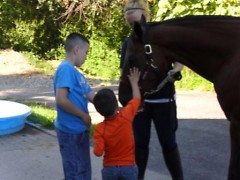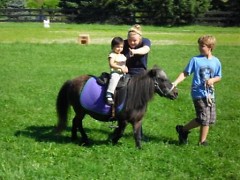“It’s like we’re not in Michigan. It’s like we’re in Wisconsin.”
That is how remote Forest Hills seems to a Burton Heights resident. Our perspective on the size of the world is usually determined by our experiences. For a child who has never been outside of a one-mile radius of their home their personal world is very small. Once they venture out of that one mile radius they become aware of how big and sometimes scary the world is.
It was an adult and parent who made the observation above. A field trip to a horse farm, barely outside the Grand Rapids city limits, precipitated the remark. Think of how small the worldview of that parent’s child must have been until that day. To that child seeing a horse is akin to the remote New Guineans in the shockumentary “Mondo Cane” seeing an airplane. To the parent, a pasture was like another state.
How likely is it that a child with so few experiences will succeed in school? The school system takes a lot of blame for the failure of children to do well academically. The fact is though that a child reqires a lot of catching up in school if they have had little access to cultural activities. One who comes from extreme poverty isn't likely to have had that access.
It’s always a nice warm story to tell people that a group of families was taken to a farm or a museum or on some other excursion. The story is more than being nice and warm though; it’s about child and family development. It’s about trying to close the academic gap between the haves and the have-nots.
In Kent County 25% of children are not ready for school. In the city of Grand Rapids the estimate is that 82% of children are not ready for kindergarten when they arrive. Go even deeper, to Burton Heights where more than half the population doesn’t speak English as their first language at home, and school readiness drops farther still. Burton Heights is a small world and a small world is a disadvantage to a five year-old. That disadvantage will follow them throughout their school years. That means we are often playing catch up with older children well into their academic years.
Before a child reaches kindergarten, 90% of their brain development has occurred. They have a natural curiosity about things. The years from zero to five are the ideal time for providing stimulating activities. Infants and toddlers have the most brain activity of any age and they deserve more than just having their basic needs met.
Beyond academic learning, children need social skills. Studies show that cooperation, self-control, confidence, independence, curiosity, empathy and communication are important skills for a child to acquire before starting school. If a child is not able to take turns, listen or sit in group they will have more difficulty with academics.
Recent research in brain development has shown that a child’s ability to interact with others, control and express feelings, and take care of basic tasks independently are as important for success in school as academic skills.
There is the benefit of teaching a child who will never ride a horse again the word “bridle”? A child who knows the word bridle doesn’t have to stop reading to look it up in the dictionary. There is also a benefit to having an older child help a younger child onto a horse and demonstrate how the bridle is used. Combining socialization with academics is what makes field trips worthwhile. They expand a child’s world in more than one way.
If you think that early childhood development programming and field trips are of limited value read this article from Dr. Tim Bartik of the Upjohn Institute.
In the article Dr. Bartik states that even when there is no measurable impact on test scores in middle and high school, participants of quality early childhood programs are more likely to graduate from high school, go to college, and earn more as adults.
The article also mentions that Michigan still falls far short of many other states in providing access to quality early education. For instance, only 16% of four year olds attend state-subsidized preschool, compared to a national average of 27%.
This doesn’t bode well for the long-term competitiveness of Michigan. It may lead to more children and parents thinking Forest Hills is so different from their neighborhood it might as well be another state.
It’s a big world. Showing a child a bigger world today will make their world and ours better tomorrow.
The Rapidian, a program of the 501(c)3 nonprofit Community Media Center, relies on the community’s support to help cover the cost of training reporters and publishing content.
We need your help.
If each of our readers and content creators who values this community platform help support its creation and maintenance, The Rapidian can continue to educate and facilitate a conversation around issues for years to come.
Please support The Rapidian and make a contribution today.



Comments
There's some conversation going on at this week's poll that you may want to speak to-such as where the statistics are coming from, how they are derived, what "ready to learn" means... Thoughts? Comments? Would love to see your voice added to the poll stream of conversation.